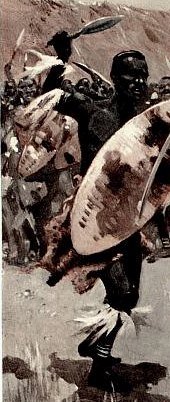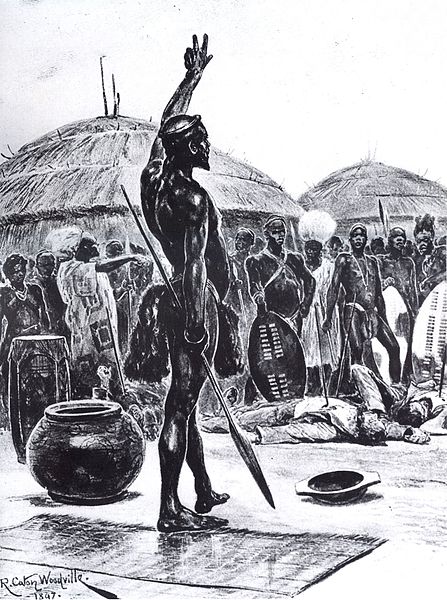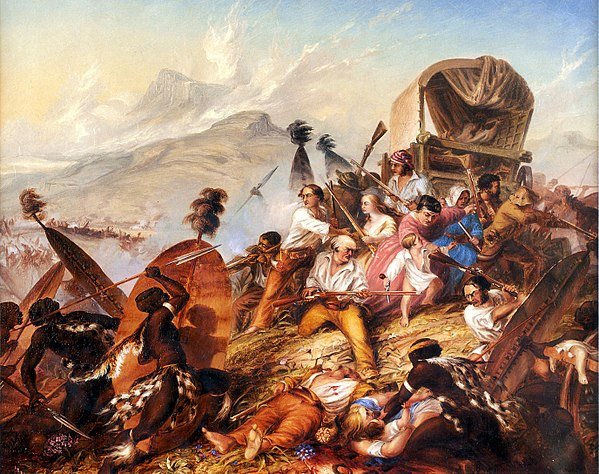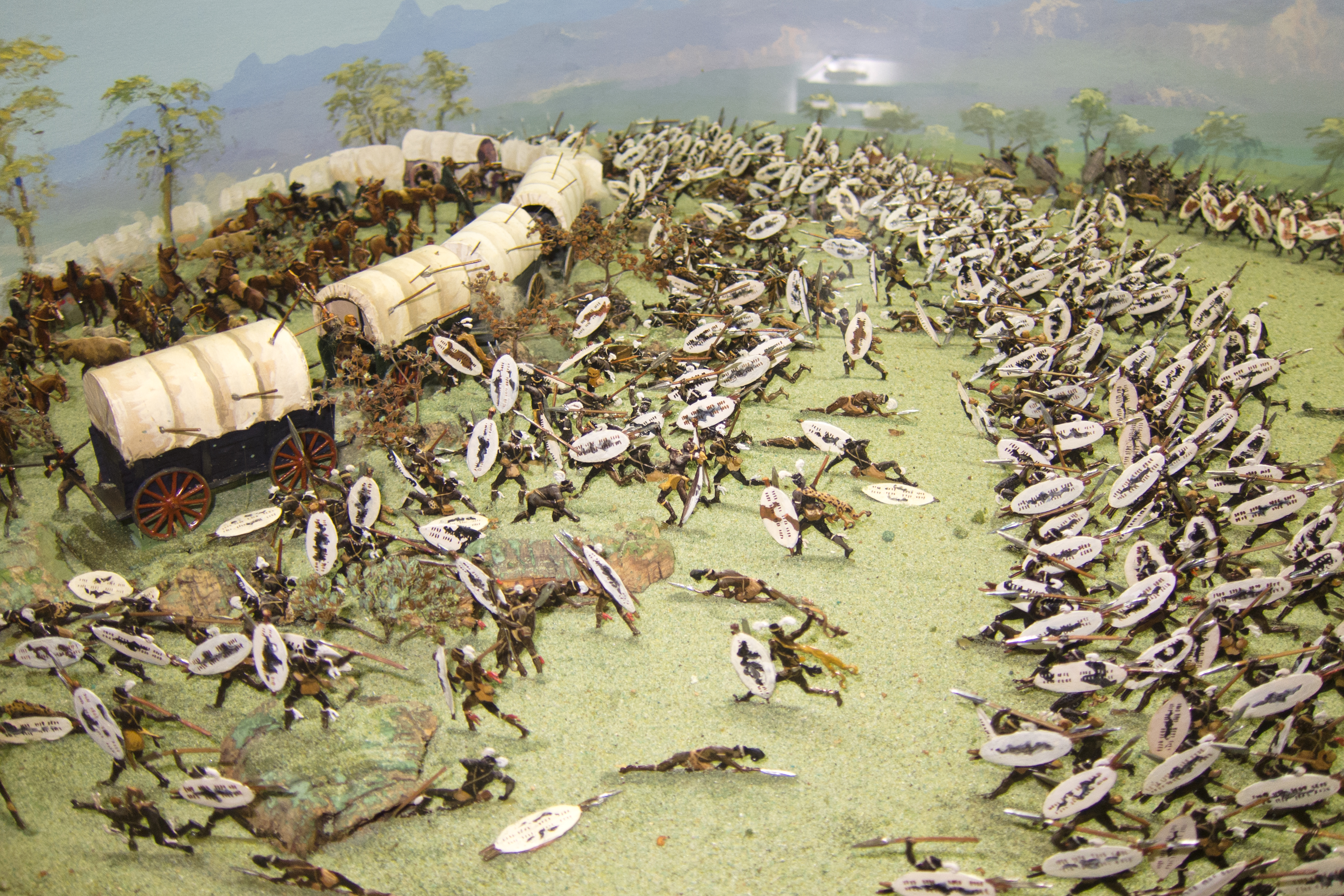Ndlela: A Tragic Figure of Zululand

Ndlela kaSompisi was a warrior-general of the Zulu at the time of the Voortrekker migration into Zululand. His cautious approach to politics, combined with his ultimate defiance of tyranny, would shape the development of the Zulu kingdom, and contribute to the fall of a brutal autocrat.
Ndlela joined Shaka’s army as a member of the conquered Ntuli tribe, yet despite being of another tribe, he impressed his superiors and quickly ascended the ranks, eventually becoming one of Shaka’s most trusted generals.
In 1828, Shaka was assassinated by his brother Dingane, who took the Zulu throne for himself. The new king was uncertain of his security, and brought about a purge of the Zulu elites reminiscent of the tyranny of Caligula. Ndlela skilfully managed to maintain his position through this reign of terror, and even became Dingane’s inDuna, or chief advisor, as well as prime minister of the Zulu kingdom.
Ndlela’s daughter was married to prince Mpande, a surviving brother of the king, whose life had been spared on account of his unambitious nature and political disinterest. Despite these traits being of great value in the intrigue-beset Zulu royal court, Dingane’s patience with his last male relative soon wore thin, and he repeatedly commanded Ndlela to destroy his own son-in-law, whom he had previously been tasked to protect.
Ndlela knew that to openly defy the king would mean his death, so he used an alternative strategy to preserve Prince Mpande’s life, passive resistance. To the king he always returned messages saying that Mpande was weak, and apathetic towards the Zulu crown, and was therefore not worth eliminating.

Before the matter of Prince Mpande came to a head, Dingane came into conflict with the Afrikaner Voortrekkers in 1838. He had struck a deal with these militarily capable Europeans. In exchange for their help in recovering cattle stolen by the Tlokwa tribe, he would grant the Voortrekkers land to settle in KwaZulu. In an infamous betrayal, the Zulu monarch had the Voortrekker leader, Piet Retief, and his entire delegation of more than 100, brutally slaughtered during the celebrations following the signature of the new treaty. Then Dingane dispatched impis, Zulu warrior regiments, to annihilate the remaining Voortrekkers.

The Afrikaners were caught unawares, but although hundreds of them were killed in the following massacre, they fought back with grim determination, and muskets. The impis were defeated and driven off, and the Voortrekkers dispatched expeditions to retaliate, and sent word to the Cape colonies for aid.
Nearly a year after Dingane’s treachery, a Boer force of around 500 men under the command of Andries Pretorius was making its way to Dingane’s stronghold at UmGungundlovu, the “secret sanctuary of the elephants”. Prince Mpande, fearing his impending assassination, had fled from Dingane by this time with many followers. These now backed him as claimant to the Zulu throne. Mpande had treated with the Voortrekkers and had found mutual cause with them in enmity towards Dingane; they now also pledged their support for Mpande’s claim. From his increasingly precarious position, Dingane sent forth his impis to engage Pretorius, with Ndlela and Dambuza as their generals.
It is at the ensuing battle, the Battle of Blood River, that I theorise Ndlela again exercised passive resistance to Dingane’s will. He let general Dambuza take his men to surround the Afrikaner position, hemming up Pretorius’ laager against the Ncome River, while he remained on the far side of the river with his own troops.
.jpg)
The battle was joined, and Dambuza’s warriors smashed into the laager with fury, but with little effect. The Voortekkers had by now been in a number of engagements with the Zulu, and their defensive tactics (creating a “laager”, or circular barrier made out of circled wagons) were finely honed. When the impis could bear the musket balls and grapeshot no longer, they broke off and fled, and were pursued by the vengeful men of the commando on horseback.
Ndlela withdrew his own forces too, having never committed to the battle. It seems to me that this may have been deliberate; partly because he did not wish to throw his soldiers away by assaulting the laager, and partly because he did not wish to score a victory against Mpande’s allies. His sense of loyalty to his son-in-law was strong.
By 1840, the Zulu Civil War was to reach its climax. Mpande’s forces clashed with Dingane’s loyalists at the Battle of Maqongqo. Here sources differ as to the order of battle. In one version, both armies assumed the horned formation typical of Zulu warfare, and Mpande’s warriors under the command of general Nongalaza were victorious, with many of Dingane’s troops defecting during the course of the action. According to other versions, the old king made yet another vital error by putting his last impis under Ndlela’s command once again. Ndlela , without openly defying orders, refused to oppose Prince Mpande. Instead of using the typical open-line “bull-horn” formation of Shaka, Ndlela used a column formation, and committed his impis one-by-one, and one-by-one they were destroyed. Ndlela was an experienced general, and had fought more battles against other Zulu (or other Bantu) armies than against Europeans. If this version of the battle was in fact the case, it is absurd to think that he did not know that he was allowing his army to perish.
Either way, Dingane certainly believed the Ndlela had betrayed him. He accused him of treason, and had the once-favoured general put to death by slow strangulation. Dingane’s destiny caught up with not long thereafter. After taking refuge in the Lubombo Mountains he was killed by Swazi warriors in Hlatikhulu Forest.
Prince Mpande was declared king of the Zulu. His coronation was supported and attended by his a delegation of Voortrekkers led by his victorious ally Andries Pretorius. He granted the Voortrekkers the land originally ceded to the Boers in the treaty signed between Dingane and Piet Retief before Dingane’s treachery. It lay between the Tugela and Port St Johns they named it the Natalia Republic.
Ndlela had forged the destiny of the Zulu people. His refusal to destroy Mpande had preserved the royal cloth (neither Shaka nor Dingane had had any offspring). Mpande’s ascension had allowed the Zulu and the Afrikaners to see common ground, and their alliance prevented what would likely have been a protracted and highly destructive conflict. Ndlela may not have lived to see the kingdom and the republic shoulder-to-shoulder in harmony, but his staunchness and determination brought the union about.
Some historians claim that it may have been Ndlela who convinced Dingane that the Voortrekkers were a threat and should be eliminated while at his mercy. If this is so then it is a black stain indeed on his character, for that fateful act of dishonour spilled an ocean of blood.
The text of this post is subject to this blog's copyright and scope specifications.
I did not know, or remember that blood river was by them, I hear blood river I think Shaka, shows how much you remember from grade 4. I really enjoyed the post and the take on Ndlela playing the game of thrones, I do think that those historians might be right. That is how I would have played it, how else do you make Dingane think he showing strength but instead have him fall from grace.
It is assumed your content is not plagiarized
But for an idea of how to just indicate your images sources and maybe article sources if you wish you can give this a read: https://steemit.com/photography/@xposed/let-s-talk-about-copyright
Thanks for the link penderis. The images I have used are free for commercial use, but the article you linked to makes a persuasive point about accrediting even free images, advice I am sure I will follow. The text was, of course, written by me. It consists mostly of what I remembered from my studies, and from a life-long interest in history, and South African history in particular, but naturally I had to do some fact checking, date checking, and looking up Zulu and Swazi names. I might have gone to town and done a full-fledged essay with links to the conflicting historical sources, but this was originally meant to be a quick tidy little post about Ndlela, though it ballooned out of all proportion as the writing went on. I'm glad you enjoyed the article, and thanks for your continued support!
It definitely helps that you know the subject so well, maintaining the element of storytelling that you might not have if you were not already acquainted with most of the facts.
If you are on discord and wish to join a few communities let me know, I don't remember if I gave you the servers last time. Would help to promote your writing, and maybe just general chat with others in the community.
P.S not sure if you get notifications via busy but I have nominated you for this weeks comedyopenmic there are a few days left but you can join next week also just follow @comedyopenmic to see when it starts. you can see the rules Rules HERE and the intro post Intro Next week will be round 6, so can keep an eye out for that. Also if ever you have questions let me know , there are plenty discords you can join if you wish to just chat with the people on here.
Thanks Penderis, you did give me the servers. I do not get notifications, and I have been terribly busy recently, and, being a Catholic, am likely to remain so until the Easter weekend has passed. Thanks for the nomination, perhaps I will find time to participate in the future. I will make a Discord account soon.
Ok cool, no pressure, was just not sure. As for notifications, you can try busy with your posting key then that might help. All and all have a good time. Keep well :)
You keep well too, and enjoy the long weekend!